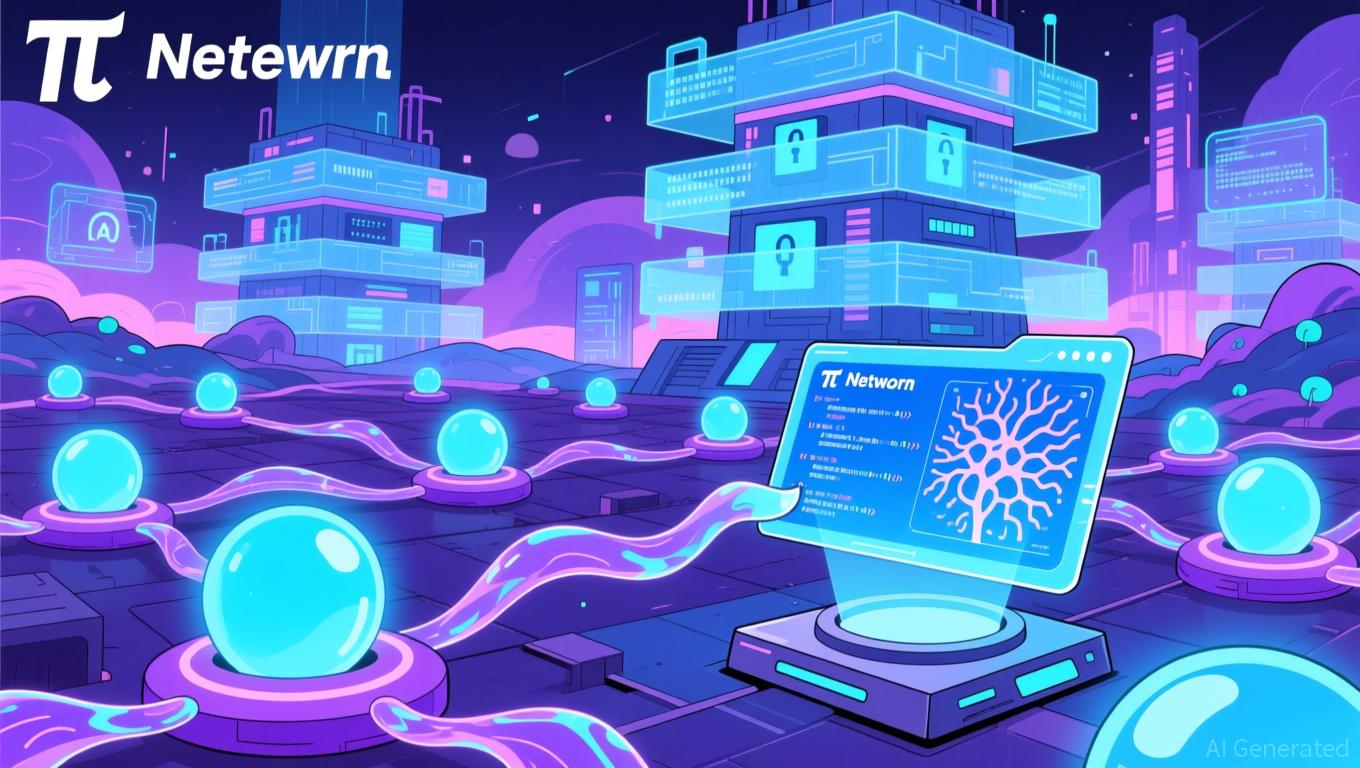Ethereum Enables the First SEC-Approved Public Equity Tokenization, Connecting Traditional Finance with DeFi
- SharpLink Gaming partners with Superstate to tokenize SEC-registered equity on Ethereum, becoming the first publicly traded company to natively issue blockchain-based shares. - The initiative aims to modernize capital markets by enabling global investor access through self-custodied wallets and DeFi integration while aligning with SEC's Project Crypto regulatory goals. - Tokenized shares will explore trading on AMMs, potentially enhancing liquidity and bridging TradFi with decentralized systems, though r

Source: [1] title1
SharpLink Gaming, Inc. (Nasdaq: SBET) has joined forces with Superstate, a fintech company, to issue its SEC-registered common shares as tokens directly on the
Through this partnership, SharpLink and Superstate will investigate the regulated trading of these tokenized shares on Automated Market Makers (AMMs) and other DeFi protocols, in line with the SEC’s Project Crypto initiative. The goal is to advance securities regulation for blockchain-based assets and markets. If successful, compliant trading of tokenized securities on AMMs could provide greater liquidity and utility for investors, while making capital movement between issuers and markets more efficient.
SharpLink’s Co-CEO Joseph Chalom highlighted that issuing equity as tokens on Ethereum signals a major evolution in global capital markets. “This is more than a technological step—it’s a vision for the future of finance,” he said. Joseph Lubin, SharpLink’s Chairman and Ethereum co-founder, emphasized that this move strengthens Ethereum’s position as a core platform for next-generation financial systems. Lubin also noted SharpLink’s significant ETH holdings, with over 838,000 ETH acquired and 3,815 ETH earned from staking since June 2025.
Robert Leshner, CEO of Superstate, called the collaboration a “landmark for an Ethereum-focused organization,” and pointed to the opportunity to grow the tokenized equity landscape. The tokenized shares will maintain SEC compliance while integrating with modular DeFi protocols, helping to connect traditional finance (TradFi) with decentralized networks. The initiative will be powered by Superstate’s Opening Bell platform, which enables companies to tokenize SEC-registered equity on the blockchain.
SharpLink’s broader ETH treasury plan, launched in June 2025, places it among the largest corporate holders of Ethereum. Its purchase of 10,000 ETH from the Ethereum Foundation in July 2025 further demonstrates its dedication to the Ethereum ecosystem. By utilizing Ethereum’s smart contracts, SharpLink intends to show how public companies can use blockchain to drive capital market innovation.
This project supports the SEC’s ongoing efforts to update regulations for digital assets. Project Crypto, a central part of the SEC’s modernization strategy, aims to encourage innovation while maintaining regulatory standards. Tokenized equities traded on AMMs could transform market dynamics by allowing for efficient and transparent securities trading, though the initiative still faces regulatory and market uncertainties.
SharpLink’s announcement includes projections about tokenizing shares and expanding staking, which are subject to risks and uncertainties. These include ETH price volatility, possible changes in securities regulations, and competition from other products. The company also mentioned that fluctuations in crypto asset values could present accounting challenges under U.S. GAAP.
The partnership between SharpLink and Superstate marks a major move toward merging blockchain with traditional finance, with potential impacts on liquidity, accessibility, and regulatory progress in capital markets.
Disclaimer: The content of this article solely reflects the author's opinion and does not represent the platform in any capacity. This article is not intended to serve as a reference for making investment decisions.
You may also like
UK’s Stablecoin Regulations Ignite Discussion: Balancing Progress and Security in Effort to Compete with US
- The Bank of England (BoE) announced a stablecoin regulatory framework with £20,000 individual and £10M business holding caps to mitigate redemption risks and ensure liquidity. - Systemic stablecoin issuers must hold 60% reserves in UK government debt and 40% in BoE non-interest-bearing accounts, with phased flexibility for new entrants. - The rules, open for consultation until February 2026, aim to balance innovation with stability while aligning with U.S. regulatory speed, despite industry concerns over

AI’s Bold Bet: Some Soar While Others Falter Amid Turbulent Tech Transformation
- AI sector volatility highlights divergent outcomes as firms adopt agentic AI systems, with SoundHound AI and Rightmove exemplifying contrasting success and risk. - SoundHound AI's Red Lobster partnership and margin improvements reduced risk perception despite high valuation, driving analyst optimism about enterprise AI adoption. - Rightmove's 25% stock plunge followed AI investment plans that slashed 2026 profit forecasts, reflecting investor skepticism toward short-term profitability trade-offs. - C3.ai
Bitcoin News Update: Nationalist Cryptocurrency Fraud Cons People Out of $6.5 Billion, Affecting 128,000
- Chinese "Cryptoqueen" Zhimin Qian faces UK sentencing for orchestrating a $6.5B Bitcoin Ponzi scheme targeting 128,000 victims, including elderly investors. - Her Lantian Gerui company used patriotic marketing and false 200% returns promises, with proceeds funding a £17,000/month London mansion and £6B in seized crypto assets. - UK authorities seized 61,000 BTC (worth $6B) and are pursuing asset recovery, as Qian's case highlights risks of unregulated crypto investments amid global regulatory crackdowns.

Pi Network’s Mainnet: Evolving from Smartphone Mining to an AI-Powered Blockchain Platform
- Pi Network's Testnet 1 achieves near-zero transaction failures, accelerating Mainnet v23 launch after successful high-volume stress tests. - Price jumps 3.5% as AI integration with OpenMind and decentralized computing prove scalability, while KYC streamlining boosts user onboarding. - Upcoming Mainnet will enable smart contracts and DeFi tools, but faces challenges including 10% price decline and only 296 active nodes currently operational.
